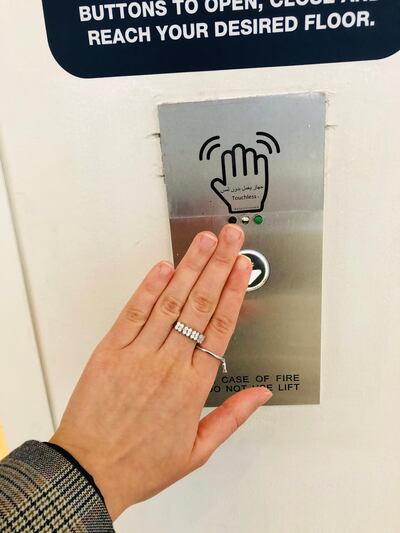The coronavirus pandemic has led to an urgent focus on medical research to develop a vaccine or a cure for the deadly pathogen.
But it has also sparked innovation in other areas of technology, as companies and universities have sought to develop products that can help contain the spread of the infection.
While some inventions have been created from scratch, others have stemmed from adapting existing technology.
Here are five examples, developed in the UAE and around the world, that have been inspired by the Covid-19 outbreak.
1. A touchless keypad
Contact with contaminated objects can spread the coronavirus, so researchers at UAE University have developed a touchless keypad for elevators.
Already deployed at Abu Dhabi International Airport, the technology uses infra-red sensors to detect fingers when they are 3cm away. The user simply puts his or her finger close to the button without touching it.
“We went through different approaches, mainly for selecting the best sensors," said Dr Fady Al Najjar, co-founder of Meta Touch, the company at UAE University’s Science and Innovation Park that developed the keypad.
"It took about one-and-a-half months. We were working intensively because of the requirement to do this as soon as possible.
“We came up with three or four prototypes until we got the current prototype, but it’s not actually finished. We’re trying to develop different types and to enhance it.”
The hope is that the system will continue to be deployed after the pandemic, helping to prevent the spread of future infections.
2. Social distancing alarms
With governments recommending the public to stay at least one metre, or in some cases two metres, apart, inventors have created alarm systems that activate when individuals get too close.
Meta Touch at UAE University’s Science and Innovation Park has developed a system that uses thermal cameras to detect where people are. The cameras do not record details of faces, so privacy is safeguarded.
“It will be just a reminder, like an alarm, that beeps when people get very close to each other," said Dr Al Najjar of Meta Touch. "It will beep to remind people to keep their distance."
New systems have also been developed that can ustilise existing cameras, including CCTV networks.
Scylla, a US and Armenian firm, uses artificial intelligence software to interpret surveillance camera footage and alert controllers if people get too close to one another.
“If they’re congregating too much, maybe the tannoy announcer can say, ‘Please be mindful of social distancing and keep two metres apart,’” said Elliot Zissman, a regional director for the firm.
3. Temperature sensors
Temperature sensors are not a perfect way to identify those infected with coronavirus, since some people can be asymptomatic.
Nevertheless, they are able to identify a proportion of individuals with Covid-19 and are widely deployed at borders, schools and other venues.
When vast numbers of people need to be tested, however, scanning a crowd with cameras can become more efficient.

Scylla’s system does just that by using a thermal camera and artificial intelligence to identify people’s foreheads and pinpoint individuals with a high temperature.
“As people walk across the field of vision of the camera, it’s taking multiple measurements," said Mr Zissman of manufacturer Scylla.
"What the software allows is to look at all these people walking past and spot the outlier. All of this can be done in less than half a second."
4. The hygiene hook
While the coronavirus has led to many high-tech innovations, some are remarkably simple.
None more so than the hygiene hook, a hand-held hook that can open and close doors, eliminating the need to touch them with hands.
Some versions have a small flat surface on the end of them so that they can also be used to push buttons on lifts or punch the keys of an ATM machine.

While these hooks existed before the pandemic, designers have been releasing versions in response to what they expect to be an increase in demand.
The hooks can easily be washed as they are typically made of non-porous materials such as plastic or metal.
Prices range widely, starting at about $1 for the most basic types and going up to about $15 for larger models.
5. The Immunotouch wristband
Wristbands are being promoted for their ability to reduce the spread of the coronavirus.
One such device is Immunotouch, developed by a company based in Seattle, United States, called Slightly Robot.
Using an algorithm to interpret data from a gravity sensor or gravimeter, the wristband can determine if a person’s hand is approaching his or her face and activate a buzzer.
The mouth, nose and eyes are all potential points where the new coronavirus can enter the body, so people can infect themselves if their hands are contaminated.

Originally developed to discourage habits such as nail-biting and hair-pulling, the Immunotouch has found renewed use since the coronavirus emerged.
Other forms of wristband are used to promote social distancing, with built-in alarms set off when the wearer steps too close to another person wearing another device. The carmaker Ford has been trialling their use to keep factory workers apart.



